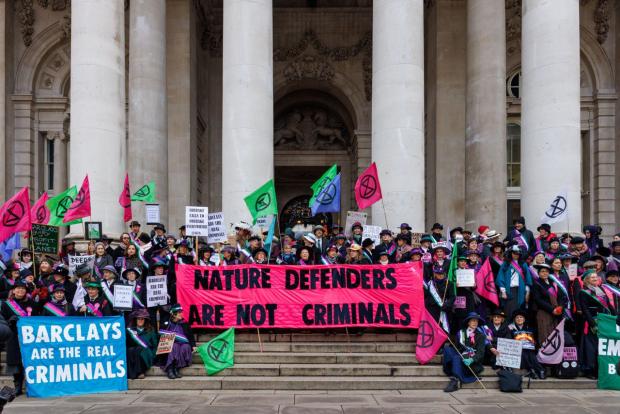More than a century on from Emmeline Pankhurst’s speech from the dock at Bow Street Magistrates’ Court, great-granddaughter Helen Pankhurst echoed its words at a protest marking the sentencing of the ‘Barclays 7’ modern-day activists: “They’re not there to be law-breakers, but to be law-makers.” Along with other campaigners, she and over 100 women dressed as suffragettes marched from the Bank of England to Southwark Crown Court where sentencing took place, bearing placards reading “Barclays are the real criminals” and “In case of emergency, break glass.”
The seven defendants – Rosemary Annie Webster, 64, Cazzie Wood, 53, Gabby Ditton, 28, Lucy Porter, 48, Sophie Cowen, 31 and Zoe Cohen, 52 and one other – were found guilty during a two-week trial last November after being charged with just under £100k worth of criminal damage at Barclays’ Canary Wharf HQ in April 2021. But given its historic and continued funding of the fossil fuel expansion accelerating the climate emergency, Barclays’ culpability may be far greater. As actor Juliet Stephenson put it, “Nonviolent protesters are today facing the prospect of prison. But we all know who the real criminals are. They are those in government, in fossil fuel companies and in banks who are refusing to take action on the climate emergency and are condemning our children and grandchildren to an unliveable future. I am glad to be here today in solidarity with those who are standing up for the environment with deeds and words.”
Protesters become law-makers when legislation finally changes to reflect the justness of their cause. The recent overwhelming vote by the Parliamentary Assembly of the Council of Europe to call for recognition of ecocide is just one example of the legislative trend towards outlawing the ecosystem destruction financed by banks like Barclays. But to be on the right side of history, and to attempt to avoid the imminent points of no return for our entire planet, Barclays should curtail those activities now.
